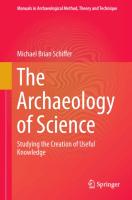- Start
- The Archaeology of Science
The Archaeology of Science
Angebote / Angebote:
This manual pulls together—and illustrates with interesting case studies—the variety of specialized and generalized archaeological research strategies that yield new insights into science. Throughout the book there are templates, consisting of questions, to help readers visualize and design their own projects. The manual seeks to be as general as possible, applicable to any society, and so science is defined as the creation of useful knowledge—the kinds of knowledge that enable people to make predictions. The chapters in Part I discuss the scope of the archaeology of science and furnish a conceptual foundation for the remainder of the book. Included are basic principles of behavioral archaeology that, because they privilege people-artifact interactions, can be employed to frame new research on science. The varieties of scientific knowledge—from observations to theories and everything in between—are defined in behavioral terms. Next, Part II presents several specialized, but widely practiced, research strategies that contribute to the archaeology of science. These chapters contain fascinating case studies from the archaeological literature that illustrate how these strategies can be employed to formulate and answer research questions. In order to thoroughly ground the manual in real-life applications, Part III presents lengthy case studies that feature the use of historical and archaeological evidence in the study of scientific activities. Many of these chapters draw on unpublished archaeological reports that bring to light the material dimension of intriguing—sometimes once secret—science and technology projects, such as the Manhattan Project, Project Rover, and Thomas Edison’s “invention factories”, to name a few. The Archaeology of Science: Studying the Creation of Useful Knowledge stimulates readers because it calls attention to a great many archaeological projects already accomplished and shows readers how they can contribute to expanding and enriching the archaeology of science. This original concept provides both advanced undergraduates and graduates, as well as professional archaeologists, with a cornucopia of strategies and tactics for conducting original—indeed, exciting—research leading to term papers, theses, dissertations, and eventually publications.
Folgt in ca. 15 Arbeitstagen
